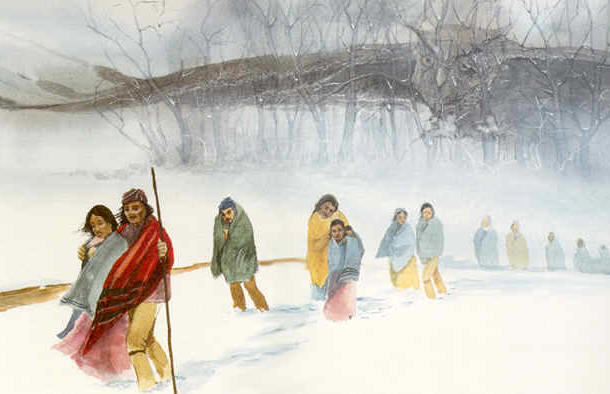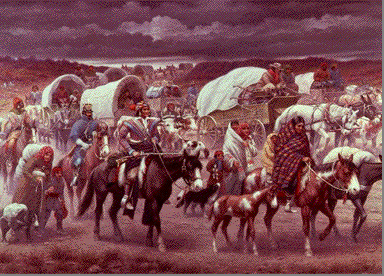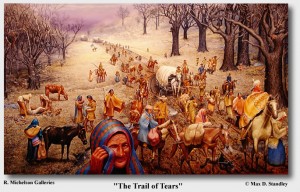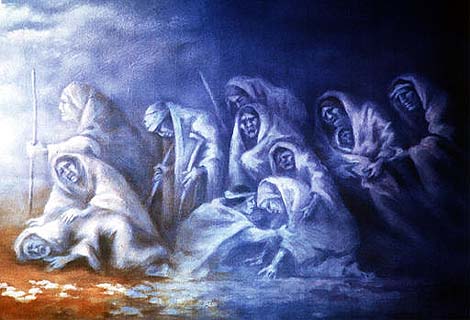Early in February, Bryan Fischer, Issues Analyst and talk show host for the American Family Association, wrote that Native Americans deserved the treatment they received from European settlers and the United States because they failed to convert to Christianity. Someone at the AFA decided to pull that article after the predictable outrage. However, he then penned an article saying that the conversation about the US treatment of native people was important because the integrity of the nation was at stake:
If, however, there is a moral and ethical basis for our displacement of native American tribes, and if our westward expansion and settlement are in fact consistent with the laws of nature, nature’s God, and the law of nations, then Americans have much to be proud of.
Fischer closed his article by chastising those who challenged him, saying:
So this is a conversation that needs to take place. But based on the reaction to my column of Tuesday, America is not mature enough right now for that robust dialogue to occur. Until it is…
Although not front page news, the conversation has been taking place and was elevated to national policy with the passage of the Native American Apology Resolution in 2009. Proposed by social conservative Senator Sam Brownback (R-KS), now Governor of Kansas, in 2004, the resolution was passed in 2009 and signed by President Obama later that year. Here I reproduce the resolution in full. If one of the most conservative politicians in the nation can see the need for such an apology, shouldn’t the American Family Association follow his lead?
Native American Apology Resolution
111th CONGRESS
1st Session
S. J. RES. 14
To acknowledge a long history of official depredations and ill-conceived policies by the Federal Government regarding Indian tribes and offer an apology to all Native Peoples on behalf of the United States.
IN THE SENATE OF THE UNITED STATES
April 30, 2009
Mr. BROWNBACK (for himself, Mr. INOUYE, Mr. BAUCUS, Mrs. BOXER, Mr. CRAPO, Ms. CANTWELL, Mr. COBURN, Mr. HARKIN, Mr. LIEBERMAN, and Mr. TESTER) introduced the following joint resolution; which was read twice and referred to the Committee on Indian Affairs
JOINT RESOLUTIONTo acknowledge a long history of official depredations and ill-conceived policies by the Federal Government regarding Indian tribes and offer an apology to all Native Peoples on behalf of the United States.
Whereas the ancestors of today’s Native Peoples inhabited the land of the present-day United States since time immemorial and for thousands of years before the arrival of people of European descent;
Whereas for millennia, Native Peoples have honored, protected, and stewarded this land we cherish;
Whereas Native Peoples are spiritual people with a deep and abiding belief in the Creator, and for millennia Native Peoples have maintained a powerful spiritual connection to this land, as evidenced by their customs and legends;
Whereas the arrival of Europeans in North America opened a new chapter in the history of Native Peoples;
Whereas while establishment of permanent European settlements in North America did stir conflict with nearby Indian tribes, peaceful and mutually beneficial interactions also took place;
Whereas the foundational English settlements in Jamestown, Virginia, and Plymouth, Massachusetts, owed their survival in large measure to the compassion and aid of Native Peoples in the vicinities of the settlements;
Whereas in the infancy of the United States, the founders of the Republic expressed their desire for a just relationship with the Indian tribes, as evidenced by the Northwest Ordinance enacted by Congress in 1787, which begins with the phrase, `The utmost good faith shall always be observed toward the Indians’;
Whereas Indian tribes provided great assistance to the fledgling Republic as it strengthened and grew, including invaluable help to Meriwether Lewis and William Clark on their epic journey from St. Louis, Missouri, to the Pacific Coast;
Whereas Native Peoples and non-Native settlers engaged in numerous armed conflicts in which unfortunately, both took innocent lives, including those of women and children;
Whereas the Federal Government violated many of the treaties ratified by Congress and other diplomatic agreements with Indian tribes;
Whereas the United States forced Indian tribes and their citizens to move away from their traditional homelands and onto federally established and controlled reservations, in accordance with such Acts as the Act of May 28, 1830 (4 Stat. 411, chapter 148) (commonly known as the `Indian Removal Act’);
Whereas many Native Peoples suffered and perished–
(1) during the execution of the official Federal Government policy of forced removal, including the infamous Trail of Tears and Long Walk;
(2) during bloody armed confrontations and massacres, such as the Sand Creek Massacre in 1864 and the Wounded Knee Massacre in 1890; and
(3) on numerous Indian reservations;
Whereas the Federal Government condemned the traditions, beliefs, and customs of Native Peoples and endeavored to assimilate them by such policies as the redistribution of land under the Act of February 8, 1887 (25 U.S.C. 331; 24 Stat. 388, chapter 119) (commonly known as the `General Allotment Act’), and the forcible removal of Native children from their families to faraway boarding schools where their Native practices and languages were degraded and forbidden;
Whereas officials of the Federal Government and private United States citizens harmed Native Peoples by the unlawful acquisition of recognized tribal land and the theft of tribal resources and assets from recognized tribal land;
Whereas the policies of the Federal Government toward Indian tribes and the breaking of covenants with Indian tribes have contributed to the severe social ills and economic troubles in many Native communities today;
Whereas despite the wrongs committed against Native Peoples by the United States, Native Peoples have remained committed to the protection of this great land, as evidenced by the fact that, on a per capita basis, more Native Peoples have served in the United States Armed Forces and placed themselves in harm’s way in defense of the United States in every major military conflict than any other ethnic group;
Whereas Indian tribes have actively influenced the public life of the United States by continued cooperation with Congress and the Department of the Interior, through the involvement of Native individuals in official Federal Government positions, and by leadership of their own sovereign Indian tribes;
Whereas Indian tribes are resilient and determined to preserve, develop, and transmit to future generations their unique cultural identities;
Whereas the National Museum of the American Indian was established within the Smithsonian Institution as a living memorial to Native Peoples and their traditions; and
Whereas Native Peoples are endowed by their Creator with certain unalienable rights, and among those are life, liberty, and the pursuit of happiness: Now, therefore, be it
Resolved by the Senate and House of Representatives of the United States of America in Congress assembled,
SECTION 1. RESOLUTION OF APOLOGY TO NATIVE PEOPLES OF THE UNITED STATES.
(a) Acknowledgment and Apology- The United States, acting through Congress–
(1) recognizes the special legal and political relationship Indian tribes have with the United States and the solemn covenant with the land we share;
(2) commends and honors Native Peoples for the thousands of years that they have stewarded and protected this land;
(3) recognizes that there have been years of official depredations, ill-conceived policies, and the breaking of covenants by the Federal Government regarding Indian tribes;
(4) apologizes on behalf of the people of the United States to all Native Peoples for the many instances of violence, maltreatment, and neglect inflicted on Native Peoples by citizens of the United States;
(5) expresses its regret for the ramifications of former wrongs and its commitment to build on the positive relationships of the past and present to move toward a brighter future where all the people of this land live reconciled as brothers and sisters, and harmoniously steward and protect this land together;
(6) urges the President to acknowledge the wrongs of the United States against Indian tribes in the history of the United States in order to bring healing to this land; and
(7) commends the State governments that have begun reconciliation efforts with recognized Indian tribes located in their boundaries and encourages all State governments similarly to work toward reconciling relationships with Indian tribes within their boundaries.
(b) Disclaimer- Nothing in this Joint Resolution–
(1) authorizes or supports any claim against the United States; or
(2) serves as a settlement of any claim against the United States.
In my view, the silence from the AFA makes them culpable for the views of Bryan Fischer. Removing the article with the explanation given by Fischer was no acknowledgement of the offense. Fischer then followed his first column with one suggesting that if only native people had followed Pocahontas example, they would not have suffered the genocidal policies of the US government. Until the AFA addresses these issues, they have lost any moral authority they may have had.



